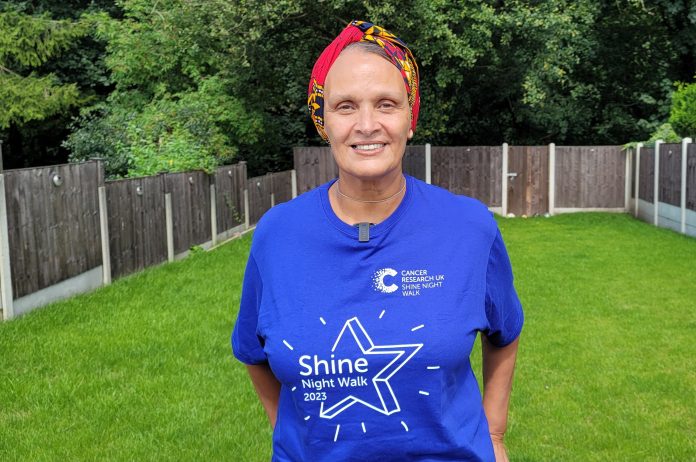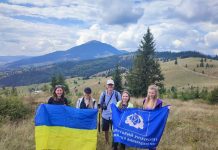CANCER survivor Farida Anderson, 61,
says a part of her always knew she would face a cancer diagnosis after losing her mum to secondary breast cancer in 1985.
Her biggest fears became reality when she was diagnosed with HER2 positive breast cancer at the beginning of 2013, shortly after her 50th birthday.
Now 10 years on, the grandma of eight from Prestwich, will mark the milestone by taking part in the charity’s 10K Shine Night Walk, which is returning to Manchester on Friday October 13.
After undergoing five years of treatment Farida understands first-hand the importance of raising vital funds for research into
new discoveries to help more people like her survive.
The mum-of-three was invited for early mammogram breast screening following the death of her own mum, Miriam, aged 48. It was following one of these tests when doctors
noticed an abnormality in her left breast.
She was given the devastating news that she had breast cancer and would be starting her treatment with a lumpectomy followed by four months of chemotherapy and then radiotherapy. Farida was also treated at home for a further 18 months with Herceptin targeted therapy – a breast cancer drug that Cancer Research UK helped to develop.
Farida, who has an MBE and an honorary doctorate from Salford University for her charity work supporting families in need, said: “I’ve got two sisters and we were told after my mum died that we’d be at a higher risk of getting breast cancer ourselves. They had no genetic evidence then as it was nearly 40 years ago, but we were advised to get checked from an earlier age. I always had a feeling that if at least one of us got cancer, it would be me. Call it a sixth sense, I don’t know, but I had this feeling, especially as I got closer to mum’s age when she died.
“My experience means I understand the importance of Cancer Research UK’s work all too clearly. When I was diagnosed, I remember leaving the appointment and coming home and wondering how I would tell the ones I love. I knew they’d think at first that, like mum, this would lead to death. But I had what I call the magic drug, Herceptin, that’s the reason I am still here.
Farida, who has a women’s centre named after her in Oldham, continued: “During chemo I lost my big afro hair, which was devastating. But for me it’s not just what you lose physically it’s what you lose mentally as well. And I lost a lot of confidence and I lost who I was. It’s taken me most of the last 10 years to find who I am again.”
Following her treatment, Farida, who also runs a Caribbean food company with her 73-year-old husband Basil, set up a support group and gym programme in her local area called FACT – fitness after cancer treatment and she ventured into theatrical performance with a show which aims to raise awareness of breast cancer.
She added: “I’m so grateful to have more precious time with my loved ones. I owe everything to research into better treatments, so I hope that sharing my story will help inspire people to sign up for the Shine Night Walk. I’d love people from the black community to join me and we can dance our way around Manchester city centre. Just think of the money we can raise. There really is no better motivation than knowing you’re helping to save lives.”
Entries for Shine Night Walk are open now and
Farida hopes people of all abilities will step up and follow in
her
footsteps to raise money for life-saving research.
Participants can choose to raise money for the area of research closest to their hearts – including prostate cancer, breast cancer, bowel cancer, lung cancer, ovarian cancer, brain tumours, children’s cancers and leukaemia. Or they can simply give their backing to Cancer Research UK’s overall work.
The event on October 13 starts at the Castlefield Bowl at 7pm, when participants will take to the city’s streets in a fun and inspirational parade of light that, stride by stride, will help beat cancer. The route passes some of Manchester’s famous landmarks including Manchester Opera House, Manchester Cathedral and Chinatown Arch.
Last year, Cancer Research UK was able to spend nearly £28m in Manchester. Research happening right now includes a study on cell division and why it goes wrong in cancer, the development of cutting-edge techniques for radiotherapy and personalising new treatments for melanoma.
Cancer Research UK spokesperson for
the North West, Jemma Humphreys said: “We want to thank Farida and people across Greater Manchester for
making our life-saving advances possible. One in two of us will get cancer in our lifetime, but all of us can support the research that will beat it.”** It’s
thanks to the generosity of our supporters, that we’ve helped double cancer survival in the UK in the last 50 years.
“But with around 41,900 people diagnosed with cancer each year in the North West***, we’re not stopping now. That’s why we hope as many people as possible will pull on their trainers and experience this special opportunity to shine a light for loved ones lost to cancer or to celebrate the lives of those who have survived.
“By raising crucial funds, every step Shine Night Walk participants take – from the Science & Industry Museum to the Royal Exchange Theatre and beyond – will help bring us closer to a world where everybody can live longer, better lives, free from the fear of this devastating disease.”
People can also show their support by volunteering on the night to help with activities, such as setting up the course or guiding participants around the city. There are lots of opportunities
to get involved, meet new people, and learn new skills.
To enter or volunteer visit shinewalk.org







